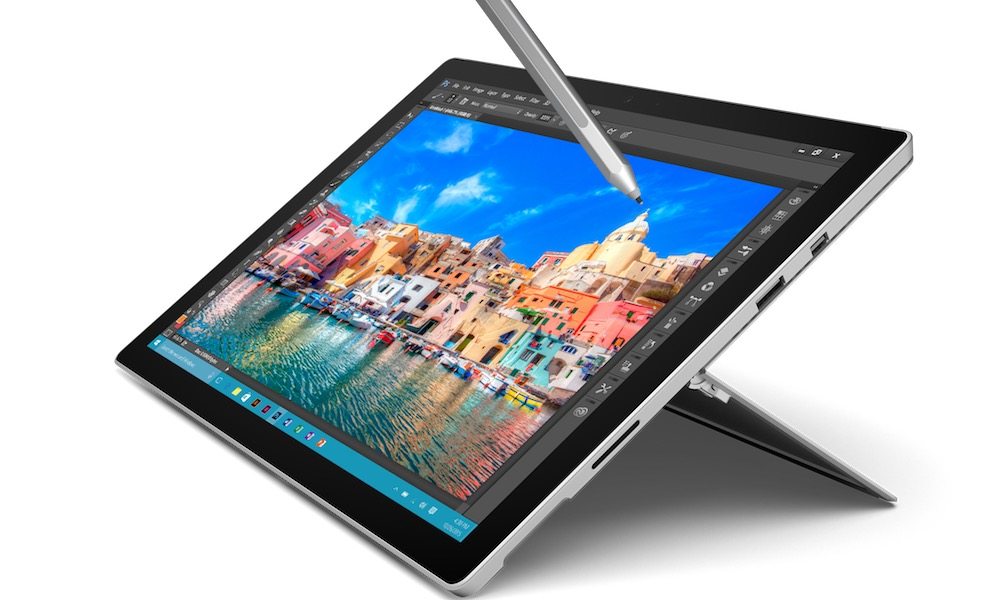iPad Pro Sales Astoundingly Beat Entire Microsoft Surface Lineup in Even Less Time

Toggle Dark Mode
The Microsoft Surface Pro has been hailed as Microsoft’s best device in years, both in functionality, and design. Turns out, however, that’s not stopping it from being outsold by the new iPad Pro.
According to Microsoft, the Surface lineup sold a hefty 1.6 million units. Sounds like a lot, right? Well, not compared to the iPad Pro. While the iPad Pro didn’t hit the market until half way through the last quarter, the device sold a massive 2 million units during the quarter.

“With these results, it’s clear that price is not the most important feature considered when acquiring a detachable – performance is,” said Jean Philippe Bouchard, IDC research director for tablets.
The iPad Pro is winning in more ways that just beating out the Microsoft Surface lineup of tablets. Because of the fact that the tablet market is in decline, many saw the introduction of a new iPad as an attempt by Apple to change that, something it did quite well, especially considering the fact that the iPad Pro is targeted more towards artists and graphic designers rather than the general public.
It’s also important to note that losing to the iPad Pro isn’t so bad for Microsoft. The company enjoyed a pretty big 29 percent sales increase year-over-year. Not only that, but it is seriously pushing the 2-in-1 market, becoming the best selling hybrid device so far. According to research by the IDC, the Surface Pro outsold the cheaper Surface 3, indicating that the market for larger tablets with keyboards is increasing. Not only that, but within the next few years the tablet-keyboard combination could become more popular than the humble laptop, which is ripe for replacement by another device.
 “One of the biggest reasons why detachables are growing so fast is because end users are seeing those devices as PC replacements,” continued Bouchard. “With these results, it’s clear that price is not the most important feature considered when acquiring a detachable — performance is.”
“One of the biggest reasons why detachables are growing so fast is because end users are seeing those devices as PC replacements,” continued Bouchard. “With these results, it’s clear that price is not the most important feature considered when acquiring a detachable — performance is.”
Of course, it’s likely that Apple is going to have to embrace that market sooner or later. While the iPad Pro is definitely a step forward towards Apple releasing more hybrid devices, the fact that it runs on a mobile operating system suggests that Apple isn’t ready to embrace the market just yet. Well, that and the fact that Tim Cook has gone on record saying that the company won’t be releasing hybrid devices anytime soon.
As time goes on, however, it’s likely that we wont just see detachable, hybrid devices in the rest of the market, but that Apple will release hybrid devices of its own. It certainly wouldn’t be too far-fetched to imaging the 2020 MacBook Pro being more of a tablet with a detachable keyboard – and with a desktop operating system.
The operating system really is what will set a new Apple hybrid device apart from a device like the iPad Pro, which uses the keyboard as more of a secondary accessory rather than a principle form of input. In the case of an OS X-based hybrid, the software keyboard may not even be present, and the detachable keyboard would be used as a primary form of input for the device.
Still, the market for hybrid devices is still very young, and while both Apple and Microsoft have found success in some measure, Android makers still have a lot of work to do, although that could be put down to the fact that Android is a mobile operating system also.
“It’s also important to note that the transition towards detachable tablets has presented positive opportunities for both Apple and Microsoft,” said Jitech Ubrani, an IDC analyst. “However, Google’s recent foray into this space has been rather lackluster as the Android platform will require a lot more refinement to achieve any measurable success.”

Sales of the iPad Pro also helped Apple stay in top spot when it comes to tablet sales, over second place, which is Samsung. This is despite the slowdown in the tablet market overall. Apple finished the quarter with 24.5 percent of the tablet market, while Samsung ended with a healthy but not-quite-Apple 13.7 percent. Surprisingly enough, Amazon finished in third due to sales of its Fire lineup, sitting with 7.9 percent of the market.
It will certainly be interesting to see what the market ends up looking like in three years. Will Apple have a hybrid desktop-OS-based tablet? Will it remain in top spot when it comes to the tablet market? Only time will tell.
Learn More: More iPad Air 3 Rumors Surface, Could it Have a 4K Display?






